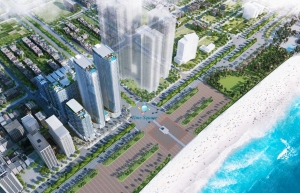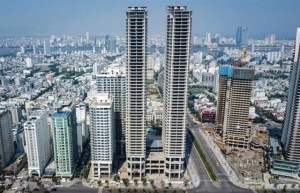Over a decade of transformation in condotel industry
When we started FSDN and ALCDN, we aimed to create a new investment opportunity that combined the benefits of property ownership with the allure of resort living. Little did we know, we were setting the stage for a significant shift in the real estate landscape of Vietnam.
 |
| Marco van Aggele, founder, Levitate International and Fusion Resorts |
The success of FSDN, with its 128 units, and ALCDN, with 203 units, demonstrated the viability of the condotel model. The projects were initially sold primarily as investment opportunities, attracting investors with promises of lucrative returns. The first few years indeed proved beneficial for early investors, driving a surge in similar developments across the country.
However, the influx of large-scale projects quickly saturated the market, challenging the sustainability of returns that early adopters enjoyed. The Vietnamese government’s liberal approach in issuing licences for new condotel projects led to an oversupply in the market.
Unlike the boutique-sized FSDN and ALCDN, many new developments were significantly larger, further diluting the market demand. Investors who entered the market later found it difficult to resell their units during construction or to maintain the promised annual returns due to the increased competition and market saturation.
Moreover, the rise of platforms like Airbnb added another layer of complexity. Many unit owners chose to rent out their properties independently, bypassing the rental pools managed by developers. This move put further pressure on the returns for those who remained within the official rental management systems. The fragmented approach to property rental has created discrepancies in returns and affected the overall value proposition of condotels.
As FSDN and ALCDN approach their ten-year mark, a new set of challenges and questions arises. One critical issue is the role of the original developer in the ongoing management and maintenance of these properties, especially as they age and require refurbishments and technical upgrades. The initial lease terms were designed with a focus on short-term investment returns, but the long-term sustainability and management of these properties now need reevaluation.
The industry must redefine the role of developers in the 50-year lease term of such projects. There needs to be a collaborative approach between owners and developers to ensure the properties remain attractive and functional. This could involve shared responsibilities in refurbishment and technical upgrades, supported by clear legislation to align the interests of both parties.
The issuance of land use and housing rights certificates for FSDN and ALCDN set a legal precedent for the condotel industry, and similarly, future legislation may be required to address the evolving needs of the sector. Such regulations could provide a framework for the mutual commitments between buyers and developers, ensuring long-term alignment and sustainability.
The condotel model has great potential, but it requires adaptive strategies to stay relevant in a dynamic market. The lessons learned from the initial projects should guide future developments, ensuring that both investors and developers can benefit from a balanced and sustainable approach.
As the condotel industry in Vietnam continues to evolve, the pioneering projects of FSDN and ALCDN may once again lead the way, setting new standards for collaboration, sustainability, and long-term success. The future of the industry hinges on the ability to adapt and innovate, ensuring that the interests of all stakeholders are harmonised for continued growth and prosperity.
| The fourth Vietnam Industrial Property Forum (VIPF 2024) organised by Vietnam Investment Review, under the auspices of the Ministry of Planning and Investment and coordinated with the Vietnam Industrial Real Estate Association, will take place at Mai House Saigon Hotel in Ho Chi Minh City on Tuesday, July 30. Themed “Going Green for New Investment Waves”, the forum will focus on assessing the growth prospects of Vietnam’s industrial property market and the development trends of specialised industrial real estate products. It will also address legal issues related to building standards for eco-industrial parks, converting existing parks to eco-parks, and green development according to ESG standards to attract new types of projects, especially high-tech and large-scale projects funded by global conglomerates. In the framework of this year’s forum, the Organising Board will implement a selection programme themed VIPF Green Future Awards. The selection is to encourage and honour investors with strategies to develop eco-industrial parks, as well as secondary investors renting land in industrial parks with green development strategies, using clean energy, sustainable infrastructure, smart management of water resources and resources in the ecosystem, and contributing to promoting sustainable development trends. The deadline for receiving registration dossiers is July 10. For more information on the forum and the awards, please visit : vipf.vir.com.vn |
 | Overload caution sounded out over condotel switch More than 3,700 tourist apartments, which are part of the Times Square Danang complex, were converted into apartments by Danang People’s Committee in May, and are now causing concern about infrastructure overload both there and at future conversions. |
 | Condotel conversion must avoid infrastructure pressure Although the conversion of some condotels to apartments has been approved in Vietnam, worries have been outlined over population density knock-on effects which may create pressure on urban infrastructure. |
 | Condotel sales at lowest level in six years Vietnam’s condotel market is facing liquidity issues, with sales hitting the lowest level in six years in the first quarter of 2024. |
What the stars mean:
★ Poor ★ ★ Promising ★★★ Good ★★★★ Very good ★★★★★ Exceptional
Related Contents
Latest News
More News
- IP alterations shape asset strategies for local investors (January 22, 2026 | 10:00)
- 14th National Party Congress: Vietnam - positive factor for peace, sustainable development (January 22, 2026 | 09:46)
- Japanese legislator confident in CPV's role in advancing Vietnam’s growth (January 22, 2026 | 09:30)
- 14th National Party Congress: France-based scholar singles out institutional reform as key breakthrough (January 21, 2026 | 09:59)
- 14th National Party Congress: Promoting OV's role in driving sustainable development (January 20, 2026 | 09:31)
- 14th National Party Congress affirms Party’s leadership role, Vietnam’s right to self-determined development (January 20, 2026 | 09:27)
- Direction ahead for low-carbon development finance in Vietnam (January 14, 2026 | 09:58)
- Vietnam opens arms wide to talent with high-tech nous (December 23, 2025 | 09:00)
- Why global standards matter in digital world (December 18, 2025 | 15:42)
- Opportunities reshaped by disciplined capital aspects (December 08, 2025 | 10:05)

 Tag:
Tag:

















 Mobile Version
Mobile Version